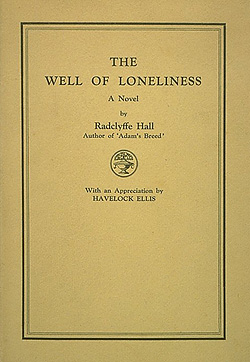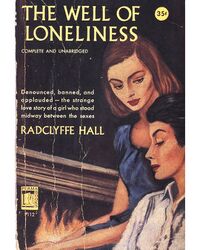The Well Of Loneliness
Relevance
In answer to the question:
"Are you moved to tears very easily?"
Morrissey replied:
"Yes, very, very easily. As a very dull example... the film Jane Eyre I sat through by accident a couple of years ago and was shocked that the floodgates opened. I'm extremely sensitive to art and I'm not ashamed to say that Jane Eyre or Wuthering Heights or The Well Of Loneliness stir within me very powerful passions, but that doesn't mean that I'm an ineffectual six-stone weakling and the suggestion irks me constantly."
(Q Magazine, April, 1994)
As Morrissey may be citing literature or the derivative film version, see also (off-site):
Olivia / The Pit Of Loneliness
Wikipedia Information
 |
The Well of Loneliness is a lesbian novel by British author Radclyffe Hall that was first published in 1928 by Jonathan Cape. It follows the life of Stephen Gordon, an Englishwoman from an upper-class family whose "sexual inversion" (homosexuality) is apparent from an early age. She finds love with Mary Llewellyn, whom she meets while serving as an ambulance driver during the First World War, but their happiness together is marred by social isolation and rejection, which Hall depicts as the typical sufferings of "inverts", with predictably debilitating effects. The novel portrays "inversion" as a natural, God-given state and makes an explicit plea: "Give us also the right to our existence". Shortly after the book's publication, it became the target of a campaign by James Douglas, editor of the Sunday Express. Douglas wrote that "I would rather give a healthy boy or a healthy girl a phial of prussic acid than this novel." A British court judged it obscene because it defended "unnatural practices between women"; not until 1949, twenty years later, was it again published in England. In the United States, the book survived legal challenges in New York state and in Customs Court. Publicity over The Well of Loneliness's legal battles increased the visibility of lesbians in British and American culture. For decades it was the best-known lesbian novel in English, and often the first source of information about lesbianism that young people could find. Some readers have valued it, while others have criticised it for Stephen's expressions of self-hatred, and viewed it as inspiring shame. The novel was subject to great criticism in its time (some of which may have been motivated by prejudice) but has come to be recognised as a classic of queer literature. The book entered the public domain in the United States in 2024.
